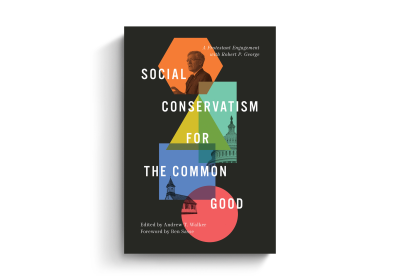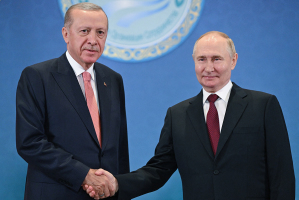The recent book that screams ‘I’m a classic!’ How the Protestant-Catholic alliance was formed (pt. 1)

Once in a while, too seldom actually, a book is published that screams, “I am a classic! I will be around for a good while and I will make a difference.” Social Conservatism for the Common Good. A Protestant Engagement with Robert P. George, (Wheaton: Crossway, 2023) is just such a book.
Social Conservatism is edited by Southern Baptist Theological Seminary Ethics Professor Andrew T. Walker, and contains chapters by various Evangelical scholars and social leaders in which they attempt to explain the ways in which Dr. Robert George's, the McCormick Professor of Jurisprudence and director of the James Madison Program in American Ideals and Institutions at Princeton University, career and “ministry” have enlarged their understanding of natural law as well as the necessity for Protestants and Catholics alike to defend the culture in defense of the core of the “permanent things”—the dignity and worth of the individual human being, religious liberty, marriage, and the family.”
Protestant scholars as diverse as David Dockery, Scott Klusendorf, Mark Tooley, Paul Miller, Jennifer Mardell Patterson, and Carl Truman share how their engagement with Robert George’s work and more importantly, with the man himself, has sharpened their arguments and made them co-belligerents in the struggle with the illiberal and narcissistic spirit of the age. Unlike most edited collections of essays, there are no weak chapters.
Dr. George is a graduate of Swarthmore College, Harvard and Oxford (D.Phil., dissertation title: “Law, Liberty, and Morality in Some Recent Natural Law Theories.”).
He then accepted an appointment to the Princeton University faculty, where he has been ever since, with increasing distinction and acclaim.
Over the years, Dr. George interacted with Evangelical leaders such as Richard John Neuhaus, Carl F.H. Henry, and Chuck Colson. Through the Madison program at Princeton, founded by George in 2000, scores of Protestant and Evangelical scholars have come through that program, greatly expanding George’s influence.
Like myself, George is an up-from-the-ranks scholar (we were the first in both our families to go to college). I have come to have great admiration for “Robby,” whom I have come to know personally through our attendance and speaking at numerous conferences. Robby also very graciously read one of my book manuscripts and made numerous very helpful editorial suggestions.
As an original signee of “The Manhattan Declaration,” I believe it represents the kind of powerful and honest Protestant-Catholic ecumenism that acknowledges the two tradition’s differences while affirming their many important agreements on the issues of marriage, life, and religious liberty. Without George’s leadership and example, it is doubtful that “The Manhattan Declaration” would have happened.
As a Princeton undergraduate (1965-1969), I was astounded when I visited Princeton for a Madison Program event to learn that my alma mater had an undergraduate population where there were apparently a thousand students involved in weekly Bible studies, approximately half Protestant and half Catholic. They also had formed an interdenominational student “chastity” society which scheduled separate events that coincided with regular student social activities that did not revolve around sexual chastity. Upon inquiry, students told me this was a direct influence of Dr. George on the undergraduate student body.
If you had told me when I graduated from Princeton in June 1969 (as a candidate for Baptist ministry) that either of those facts could have happened at Princeton three decades later, frankly I wouldn’t have believed it to be possible. Such was the influence of one Robert P. George.
Dr. George has one secret weapon going for him that has served him well over the years, aside from a towering intellect, and possessing no need to try to prove that to you. He really doesn’t care what The New York Times thinks of him. He was described in 2009 by the Times’ David Kirkpatrick as “this country’s most influential conservative Christian thinker.” Robby’s reply is very revealing—“I don’t believe a word the New York Times says, and I don’t believe anyone should believe that claim.”
Robby’s philosophy, his life, and his impact, I believe, is admirably summarized by his reply to Andrew Walker in the book’s afterward, “Seeking the Truth, Speaking the Truth. A Dialogue between Robert P. George and Andrew T. Walker.”
Walker asked, “What advice would you give to young scholars and public intellectuals right now, in this particular age we’re living in?”
Robby’s reply is wisdom personified. Robby says first, you must “Seek the truth and speak the truth.”
Then, “You also need the virtue of the love of truth.”
“Third, you need intellectual humility.”
Then, George says you must have “courage.”
As someone who has already read this book (devoured it might be more accurate) twice, let me give you a clue. Read the afterward first. The afterward consists of a most illuminating interview of Robby George by Andrew Walker, the book’s editor.
Doing this will significantly enhance your reading of the preceding chapters.
Next week, more on this critically important book. Any Christian seeking to confront and contend intellectually and spiritually with the narcissistic nihilism eroding in our culture will benefit from reading this book and reading it carefully.
More on this important book next week.
Dr. Richard Land, BA (Princeton, magna cum laude); D.Phil. (Oxford); Th.M (New Orleans Seminary). Dr. Land served as President of Southern Evangelical Seminary from July 2013 until July 2021. Upon his retirement, he was honored as President Emeritus and he continues to serve as an Adjunct Professor of Theology & Ethics. Dr. Land previously served as President of the Southern Baptist Convention's Ethics & Religious Liberty Commission (1988-2013) where he was also honored as President Emeritus upon his retirement. Dr. Land has also served as an Executive Editor and columnist for The Christian Post since 2011.
Dr. Land explores many timely and critical topics in his daily radio feature, “Bringing Every Thought Captive,” and in his weekly column for CP.




























